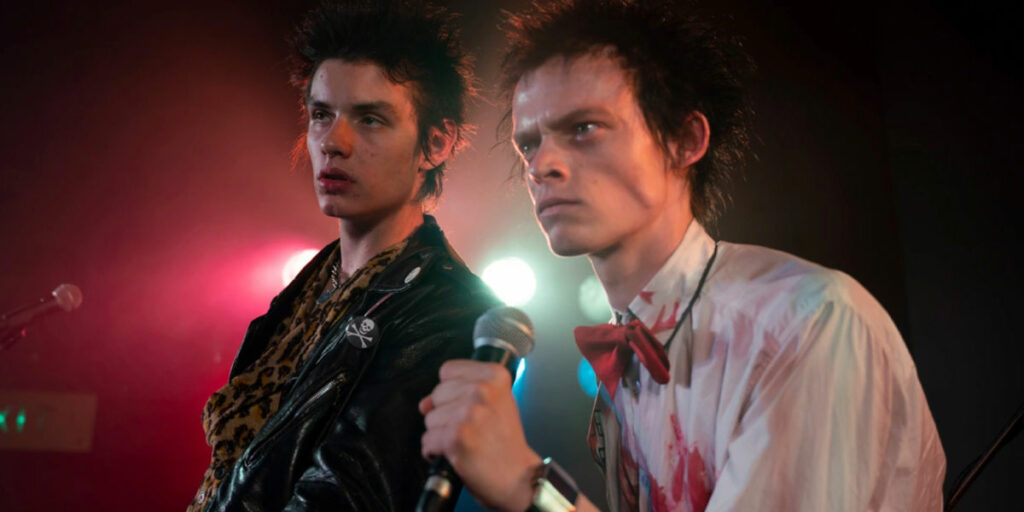Danny Boyle’s Sex Pistols series biopic, Pistol, is a disappointment; it’s over-stylized and has little to no insight into the band’s short career.
I have a very keen fascination with the 1970s and 80s punk scene, notably its London setting, where it all transpired. There are plenty of mesmerizing rock n’ roll superstars and fashion idols that have been created (or found their way into fame) because of that movement that both shocked the world and motivated the youth to rebel against the higher-ups. Over in the United States, bands like Blondie (my favorite band of all time), Bad Brains, The Ramones, Dead Kennedys, and Richard Hell and The Voidoids were rising and revolutionizing music. Meanwhile, in the United Kingdom, there were the likes of The Clash, The Damned, Siouxsie and The Banshees (whom I love to a great degree), and The Sex Pistols (who were named The Strand and The Swankers before their rise to fame). The latter band was never critically acclaimed, but it was definitely revolutionary, one way or another. They were the personification of the movement: the anarchy, the defiant lyrics against the patriarchy, and you can’t forget about their look (the spiked-up hair, the all-around leather get-up, the chains, etc).
In the past, there have been a couple of projects that targeted them, Lech Kowalski’s documentary D.O.A.: A Rite of Passage and Julien Temple’s The Filth and the Fury and The Great Rock n’ Roll Swindle. Since these projects are documentaries, they are direct projections of the band; one of them is even the recap of their rise to fame told by their manager Malcolm McLaren. Nonetheless, the most interesting one is Alex Cox’s Sid and Nancy in terms of portrayals. It is a gritty and grimy sentimentalization of Sid Vicious and Nancy Spungen’s relationship – showing the highs and lows of their bond divided into two halves (their time in London and New York). The main refrain was that “love kills,” and for those two, it ultimately did, as it ended in tragedy. Although I’m not the biggest fan of them, I was very excited when it was announced that acclaimed director Danny Boyle was taking a crack at their story.
With his directorial heft and style, there was high anticipation. Unfortunately, it doesn’t lead to much at all, as it is a paper-thin and extremely rushed portrayal of the band. This six-part series of the Sex Pistols’ story is told mainly through the eyes of its guitarist, Steve Jones, adapted from his 2016 memoir, “Lonely Boy: Tales from a Sex Pistol”. This causes the narrative to be centered around his perspective alone instead of relying on a viewpoint that could capture all truths without biases. In addition, the narrative at hand feels that it doesn’t have the proper focus for what it wants to say about the band, which, in the end, isn’t pretty much. Pistol begins with a clip-show of several highlights that made the 70s, backed by David Bowie’s song, “Moonage Daydream”. You’d think these quick clips would only be used to introduce the series and its selection of characters, but they are used all over each episode, to the point where you get tired of them sooner rather than later. Instead of bringing a feeling of nostalgia and submerging the viewer into the era, there’s a bit of annoyance.

The series is divided into tracks (Track 1: The Cloak of Invisibility, Track 2: Rotten, Track 3: Bodies, blasé blasé), intertwining the creation of one of their songs with the story told in each episode. From the initial moments, you can see that Boyle is fascinated with the punk movement and the era’s music, but that intrigue hurts the series more than it helps it achieve what it was set out to do. And here’s why. The first reason is because of its looks, aesthetics, and over-indulgence in nostalgia – the exact opposite of the classic refrain “show don’t tell”. It’s shot in the academy aspect ratio with a grainy look and adds some footage from the era. It is drenched in nostalgia, and it wants to force-feed it to the audience. But that isn’t all. The jukebox soundtrack, which contains songs that I really like, is too excessive; there are too many tracks on each episode that it gets very overwhelming.
What’s brilliant about Alex Cox’s Sid and Nancy is that it showed the streets of London the way they were back in the late 70s. The dirt and grime oozed from the screen and into our rooms; you could smell the beer, spit, smoke, and grime. Although it had some moments of hallucinations to deliver the effects of the drugs these two souls were taking, everything seemed grounded and humanistic. It didn’t promote their lifestyles; it just showed a tale of doomed love. The mannerisms by Oldman’s Vicious and Webb’s Spungen seemed true-to-life to the accurate personas they were interpreting. Meanwhile, in Pistol, it looks like quite the opposite in many of those aspects. It is over-stylized with neon lights and lots of pastel colors, highly edited, and poorly lit (to the point where its grotty and filthy settings look nice and clean). It’s perfectly described by Sid Vicious’ line (played by Louis Partridge) in episode five: “Nobody cares about how you sound; it’s how you look that matters.”
Well, it seems that Boyle took that quote literally when he was crafting this series. The second reason why this series doesn’t work is that the whole story of the Sex Pistols is jam-packed into six episodes. The series doesn’t highlight anything in particular; it just scrolls through several critical moments of their careers for a couple of minutes to switch to the next one later. There isn’t enough room to capture their initiation and eventual burnout and, simultaneously, divide its approach from nihilistic and sentimental. As a result, the final product doesn’t gel. And when it focuses on the bandmates, it isn’t that interesting to begin with. The most engrossing segments of the series revolve around the ladies that are part of their careers – the most intriguing characters of it all (Chrissie Hynde, Vivienne Westwood, Pamela Rooke, Nancy Spungen, Soo Catwoman, Siouxsie Sioux, etc). They are the highlight and saviors of this series, particularly Sydney Chandler’s Hynde and Maisie Williams playing the late Pamela Rooke (aka. Jordan).
Their characters are rich and their performances even richer, but they are mostly sidelined since the series is about a rowdy band and their crazed behavior. Maisie Williams is perfectly cast as Rooke, from the mannerisms to the looks – they even got to meet each other before she passed); eighty percent of the series’ best scenes come from her. Beth Dillon makes a couple of appearances as the rock icon Siouxsie Sioux that I immensely loved, albeit she rarely gets the chance to talk. I don’t know why there hasn’t been a documentary that tackled these women and their careers before and after meeting these individuals. Their stories are far more fascinating than Vicious or Rotten’s. This Sex Pistol biopic limited series has little to no spark whatsoever nor highly alluring features outside of the performances (once again, the women steal the show). In the end, it is yet another paper-thin insight of a famed band.
Pistol is now available to watch on Hulu. Stream Pistol!

